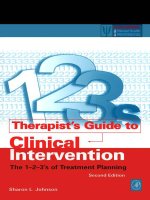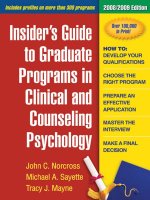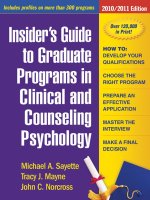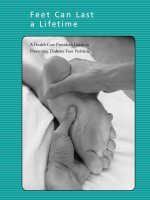BOY’S GUiDE TO BECOMING A TEEN potx
Bạn đang xem bản rút gọn của tài liệu. Xem và tải ngay bản đầy đủ của tài liệu tại đây (5.07 MB, 130 trang )
BOY
’
S
GUiDE
TO BECOMING A
TEEN
Amy B. Middleman, MD, MSEd, MPH, Medical Editor
Kate Gruenwald Pfeifer, LCSW, Writer
ffirs.qxd 3/27/06 10:40 AM Page 1
BOY
’
S
GUiDE
TO BECOMING A
TEEN
Amy B. Middleman, MD, MSEd, MPH, Medical Editor
Kate Gruenwald Pfeifer, LCSW, Writer
ffirs.qxd 3/27/06 10:40 AM Page 1
This book is printed on acid-free paper.
Copyright © 2006 by The American Medical Association. All rights reserved.
Published by Jossey-Bass
A Wiley Imprint
989 Market Street, San Francisco, CA 94103-1741
Developed by Nancy Hall, Inc.
Illustrations by Brie Spangler
The recommendations and information in this book are appropriate in most cases and current as of the date of
publication. For more specific information about a medical condition, the AMA suggests that you consult a physician.
No part of this publication may be reproduced, stored in a retrieval system, or transmitted in any form or by any
means, electronic, mechanical, photocopying, recording, scanning, or otherwise, except as permitted under Section
107 or 108 of the 1976 United States Copyright Act, without either the prior written permission of the Publisher, or
authorization through payment of the appropriate per-copy fee to the Copyright Clearance Center, Inc., 222 Rosewood
Drive, Danvers, MA 01923, 978-750-8400, fax 978-646-8600, or on the Web at www.copyright.com. Requests to the
Publisher for permission should be addressed to the Permissions Department, John Wiley & Sons, Inc., 111 River Street,
Hoboken, NJ 07030, 201-748-6011, fax 201-748-6008, or online at
Limit of Liability/Disclaimer of Warranty: While the publisher and the author have used their best efforts in preparing
this book, they make no representations or warranties with respect to the accuracy or completeness of the contents of
this book and specifically disclaim any implied warranties of merchantability or fitness for a particular purpose. No
warranty may be created or extended by sales representatives or written sales materials. The advice and strategies
contained herein may not be suitable for your situation. You should consult with a professional where appropriate.
Neither the publisher nor the author shall be liable for any loss of profit or any other commercial damages, including
but not limited to special, incidental, consequential, or other damages.
Readers should be aware that Internet Web sites offered as citations and/or sources for further information may have
changed or disappeared between the time this was written and when it is read.
Permission is given for individual classroom teachers to reproduce the pages and illustrations for classroom use.
Reproduction of these materials for an entire school system is strictly forbidden.
Jossey-Bass books and products are available through most bookstores. To contact Jossey-Bass directly, call our
Customer Care Department within the U.S. at 800-956-7739, outside the U.S. at 317-572-3986, or fax 317-572-4002.
Jossey-Bass also publishes its books in a variety of electronic formats. Some content that appears in print may
not be available in electronic books.
Library of Congress Cataloging-in-Publication Data
American Medical Association boy’s guide to becoming a teen.
p. cm.
Includes index.
ISBN-13: 978-0-7879-8343-7 (pbk. : alk. paper)
ISBN-10: 0-7879-8343-8 (pbk. : alk. paper)
1. Puberty—Juvenile literature. 2. Teenage boys—Physiology—Juvenile literature.
I. Title: Boys’ guide to becoming a teen. II. American Medical Association.
RJ143.A43 2006
613'.04233—dc22
2005034809
Printed in the United States of America
first edition
PB Printing 10 9 8 7 6 5 4 3 2 1
ffirs.qxd 4/20/06 8:58 AM Page 2
This is a very important, very exciting time in your life as you go through
so many changes on your way to becoming an adult. Along with the
transformation your body is undergoing, many other things in your life
are changing, too. For example, your relationships with your parents and
your friends may be different now than when you were younger, and
people may treat you differently. Also, the way you look at things is
probably not the same as it used to be. Of course, you have lots of
questions. We at the American Medical Association have created this
book to give you the answers to many of those questions—information
that can help you grow up healthy and happy. You can also turn to your
parents, your doctor, and other trusted adults whenever you need more
information, guidance, or help. With more facts, you can make even better
decisions to keep yourself safe.
In this book, you will learn how to deal with common concerns boys have,
such as body changes, acne, and relationships. You will learn why it’s so
important, even at your age, to eat a healthy diet and to be physically
active. This book also discusses many of the issues that may soon be
facing you or your friends, including how to resist pressure from other
kids to drink alcohol, smoke cigarettes, use drugs, or start becoming
sexually active.
The handy glossary at the back of the book explains some of the
medical terms used in the book. Also at the end of the book, you’ll find a
list of helpful Web sites to go to for more information.
We at the AMA wish you good health on your journey into adulthood!
American Medical Association
FOREWORD
ffirs.qxd 3/27/06 10:40 AM Page 3
Michael D. Maves, MD, MBA Executive Vice President,
Chief Executive Officer
Robert A. Musacchio, PhD Senior Vice President, Publishing
and Business Services
Anthony J. Frankos Vice President, Business
Products
Mary Lou White Executive Director,
Editorial and Operations
Amy B. Middleman, MD, MSEd, MPH Medical Editor
Donna Kotulak Managing Editor
Mary Ann Albanese Art Editor
Arthur Elster, MD Director, Division of Medicine
and Public Health, AMA
Missy Fleming, PhD Program Director, Child and
Adolescent Health, AMA
Mary R. Casek, MAT Educational Consultant
ffirs.qxd 3/27/06 10:40 AM Page 4
CONTENTS
FOREWORD 3
Chapter One:
WELCOME TO PUBERTY 6
Chapter Two:
EATING, EXERCISE, AND A HEALTHY WEIGHT 16
Chapter Three:
YOUR HEIGHT 30
Chapter Four:
YOUR SKIN, TEETH, AND HAIR 36
Chapter Five:
YOUR REPRODUCTIVE SYSTEM—INSIDE AND OUT 54
Chapter Six:
ERECTIONS, WET DREAMS, AND MASTURBATION 64
Chapter Seven:
YOUR FEELINGS 70
Chapter Eight:
RELATIONSHIPS 84
Chapter Nine:
WHAT ABOUT SEX? 98
FIND OUT MORE! 112
GLOSSARY 116
INDEX 125
ftoc.qxd 3/24/06 2:35 PM Page 5
6
If you’re reading this, it’s probably because you’re about to
become a teenager. There are a lot of great things about becoming
a teenager. You get taller, bigger, and stronger. You get better
at many of the things you enjoy doing, like playing a musical
instrument, drawing, or being on the soccer team. You begin to
have more freedom—to go more places and do more things with
your friends. You may start dating. You may even get your first job
and have your own money to spend in ways that want to spend
it. These things all make becoming a teenager an exciting time in
your life.
This book will help you know what to expect as your body and
mind go through some pretty major changes. It will answer most,
if not all, of the many questions you are likely to have as you go
through puberty. Of course, it’s also a very good idea to talk to your
parents, other family members, a doctor or nurse, or other trusted
adults about any concerns you have.
CHAPTER ONE
Welcome to Puberty
you
c01.qxd 3/24/06 2:22 PM Page 6
7
What is puberty?
Puberty is the process that your body goes through as you grow from a child
to an adult. During puberty, your body and mind change in many ways.
Puberty is also the time when your voice gets deeper and you start to look
less like a kid and more like a grown-up.
Some of the changes you will
notice as you go through puberty:
◆ You get taller.
◆ Your shoulders get wider.
◆ Your muscles get bigger.
◆ You grow hair in new places.
◆ Your voice gets deeper
and lower.
In addition to these
physical changes, you
might notice other
changes in yourself. Your
relationships with your
family and friends might
change, too. It’s not
always easy to go through
so many changes so quickly.
Puberty can be exciting, confusing,
scary, or no big deal—each reaction is perfectly normal.
Hey! Don’t be shy about asking questions.
Remember that all adults were once as young as
you and went through the same changes!
[
]
Does this ever happen to you?
• Your body seems to look and feel different every week.
• Your voice cracks when you answer a question in class and you
hope no one noticed.
• You spend more time with new friends than with old ones.
c01.qxd 3/24/06 2:22 PM Page 7
What is adolescence?
Adolescence is the period of time between the end of childhood development
and adulthood. This period starts at about age 11 or 12 and continues through
the late teen years and early 20s. Adolescence is a time of change—learning
who you are and who you want to become—and it includes the path to
getting there.
How long does puberty last?
Puberty generally starts sometime between the ages of 9 and 14. For many
boys, it takes about 5 to 6 years to go through all the different stages of
puberty. But every boy is unique and will go through puberty in his own way
and at his own pace.
You might notice that some boys in your class seem to be finishing the last
stage of puberty while other boys seem to still be in the first stage. This is
normal, because there is no exact timetable for puberty that everyone follows.
8
c01.qxd 3/24/06 2:22 PM Page 8
9
How should I feel
about puberty?
Different boys have different feelings
about starting puberty. Some boys
can’t wait to see changes in their body.
They feel ready to look and act more
like an adult. Other boys are not quite
so ready. They’re still interested in
their old toys and games and are
comfortable still being a kid. And some
boys alternate between feeling ready
and feeling not quite so ready to move
on. Whichever of these ways you feel
is normal.
It can be hard to be one of the first boys in class to go through puberty. You
may feel that people expect you to act older than you really are. Or some kids
may tease you about your facial hair or having to use deodorant before
everyone else.
It can also be hard to start puberty later than
your friends. It can seem like people still see
you as a younger kid. Or you might be
teased for being shorter or smaller than
other kids.
The fact is, boys start puberty at
different ages. There is no “normal” age
for puberty to begin. Also, some boys
may start puberty earlier than other boys
but end puberty later. Knowing that, if you
still feel worried about starting puberty, talk
to your parents or your doctor. Ask your father
when he started puberty. Chances are that you will
go through puberty at a similar age as, and in a similar way to, your dad.
Whether you go
through puberty
early or late, you're
going to go through
it in your own way.
Try to focus more
on enjoying it than
worrying about when
it will happen!
c01.qxd 3/24/06 2:22 PM Page 9
Why will my feelings
change during puberty?
Puberty is a time when many boys become more self-conscious. You may find
that you begin to worry more than before about how others see you. You may
start to compare yourself to your friends, noticing that some of them look
older than you and that some seem better at things you find important, like
playing sports or getting attention from other people.
You may notice that you and your parents don’t always seem as close as you
used to be. You may not want your parents to know as much about your life
as you were willing to share when you were younger. Your parents might ask
you if there is something wrong because you may be more quiet or keep to
yourself more than usual.
Puberty is also a time when you may begin to think about the world and
your place in it. You might decide to pursue some special interests. You may
start to read newspapers or watch the news and learn about some issues in
the world that concern you. You may even notice something about your
school or your neighborhood that troubles you. Can you make a difference,
and, if so, how? These are all normal feelings and questions for teenagers.
The changes you are experiencing occur for many reasons. One reason is that
your hormones are changing. Hormones are chemicals that are responsible for
many processes in the body, including growth and development, and even
mood. During puberty your way of thinking also changes as your brain
further develops.
10
Does this ever happen to you?
One minute you may feel like a kid who wants to play and the next minute
you feel more grown-up, wanting more freedom and independence.
c01.qxd 3/24/06 2:22 PM Page 10
Another reason you may be
feeling different is that your
life is changing. You may
have switched schools,
starting middle school or
junior high. You may feel
more pressures and
responsibilities as you get
older. You may have made
new friends, started thinking
about dating, or gone
through a family change
like a divorce or moving to a
new town. These are all big
changes and they are likely
to affect the way you feel.
If you have special needs or a
long-term illness, whether or
not others know about it,
going through the many
changes of puberty can
sometimes be challenging.
You’re certainly not alone.
Whenever you find things
especially difficult, you’ll feel
better if you express your
feelings to your parents, your
doctor, the school nurse, a
counselor, or another adult
you trust. It can also be
helpful to talk to other kids
your age—you’ll quickly
realize that you all have a lot
in common.
11
Some Ways You Can
Make a Difference
• Help an elderly neighbor.
• Read to a younger child.
• Organize a fundraiser for a
worthy cause.
• Stop an act of bullying.
• When you’re old enough,
volunteer at a local hospital,
nursing home, soup kitchen,
or animal shelter.
c01.qxd 3/24/06 2:22 PM Page 11
Why do I care more about what I look
like? I never used to think about it.
You might notice that how you look seems more important as you become a
teenager. You overhear girls talking about which boys they think are cute and
see them giggle as you walk by. You may begin to wonder if they think you’re
cute and if any of that giggling has to do with you.
You might start comparing yourself to other boys in your school and
neighborhood. Some of them might seem taller and more muscular than you.
You may think, “I hate getting
changed for gym in the locker
room. I’m the only boy who
hasn’t started to grow
underarm hair yet. I still look
like a kid!” Or “I’m one of
the shortest boys in my
grade—people never seem
to pay attention to me!”
These are common
ways that
boys your
age compare
themselves
to others.
It’s pretty easy to start
feeling bad about
yourself or worried that
others don’t think you look that
great. The bottom line is that nobody has the perfect body, or face, or set of
muscles. Not even those guys you see in fitness magazines! Although it’s
normal to find things about yourself that you want to change, try not to be
too critical of yourself. Constantly putting yourself down does nothing but
make you feel bad. Try to remind yourself of the things you like about yourself
12
c01.qxd 3/24/06 2:22 PM Page 12
when you start to feel bad. Here’s an
example: “I may be shorter than most
boys, but I’m really funny and easy to
talk to.” Or, “I may be smaller than
most of the other kids, but they’re
always asking me for help with math.”
If you’re having a hard time finding
those good qualities in yourself, ask
someone you trust—a good friend or a
parent or another adult you look up to.
You might be surprised to hear how
many good things the people who
know you see in you!
What is happening to
my voice lately? One minute it sounds
squeaky and the next it sounds so deep.
During puberty, your vocal cords grow longer and wider. Your voice box
(which doctors call the larynx) grows too. This change to your vocal cords
causes your voice to get lower and deeper,
making you sound more like an adult
than a child. But don’t expect this
change to happen overnight!
While it’s happening, your voice
might seem to go up and
down. It can sound high-
pitched and squeaky one
minute and deep and scratchy
the next. This is normal. But
don’t worry—the squeaking
will stop and your voice will
even out at the lower range.
13
Did you know that the
photographs of guys you see in
fitness magazines and ads have
been touched up quite a bit to
make them look more muscular
and to make their skin look more
clear? These men would look very
different if you saw them in
person. They would look more like
everyone else—not perfect!
c01.qxd 3/24/06 2:22 PM Page 13
14
REAL BOYS,
REAL FEELiNGS
I play on a hockey
team. My dad wants
me to try out for the
baseball team because
he used to play it. I
don’t know how to tell
him that I just want to
play ice hockey. Age 11
My dad yells at my
soccer coach during
games and makes me
want to crawl in a hole.
It makes me not want to
play sports. I have to say
something to him. Age 10
I’m skinny and I want to bulk up, so a friend told
me about steroids. My dad found out about it
and printed out a list of all the scary things
steroids could do to me. I don’t want to deal
with those problems, so I’ll stick to push-ups
and lifting weights. Age 12
c01.qxd 3/24/06 2:22 PM Page 14
15
One of the guys at
school found some pills.
I don’t want to “rat” but
I’m scared that some of
my friends will take the
pills with him. Age 12
My parents want
me to stop playing so
many video games, but it’s
my favorite thing to do. My
grades are good. I don’t
see why I can’t spend
my time how I want.
Age 10
I go to dance class with my older sister.
One of my friends found out and says I’m a
sissy. I like the classes and I like to dance
so I don’t care what he says. Age 10
c01.qxd 3/28/06 9:41 AM Page 15
16
Most teenage boys worry about what their body looks
like. Everyone wants to look good. But what does
looking good mean to you? Do you want to be big and
muscular? Or would you prefer to be thin and lean? Do
you worry about being chubby? Or do you struggle
with feeling you’re skinny? No matter what body type
you have—or want—there are certain things you
should know that can help you stay healthy.
CHAPTER TWO
Eating, Exercise,
and a Healthy Weight
c02.qxd 3/27/06 2:16 PM Page 16
17
Why do I need to pay
attention to what I eat?
It’s especially important to be a healthy eater at this
time in your life. Your brain and body need
nutritious food at regular times so you can
learn, grow, and be active. If you eat too
many of the wrong kinds of foods, your
body isn’t getting the vitamins, minerals,
and other nutrients it needs to function well
and keep you healthy. Foods like french fries,
chips, sugary soft drinks and fruit drinks have lots of calories but few of the
nutrients your body needs. Also be aware that fruit drinks are not so good for
you because they contain a lot of sugar and little else besides water; it’s much
healthier to eat an orange or an apple or other fruit than to drink fruit juice.
How often do I need to eat?
Eating frequently is important. You should be eating three meals a day, with
one or two snacks in between. Nutritious food enables your body and muscles
to grow and develop.
Have you ever noticed that it can be really hard to concentrate in class if
you’ve skipped breakfast? Your brain does not function at its best when you
go for long periods without eating.
Hey! You are at the perfect age to start taking
charge of your health! The two best ways to do that
are to eat healthy foods and get lots of exercise.
[
]
Does this ever happen to you?
When you skip breakfast:
◆ You get a headache in the middle of the morning.
◆ You do badly on a test.
◆ You fall asleep in class.
◆ You have trouble paying attention to the teacher.
c02.qxd 3/27/06 2:16 PM Page 17
Many boys find that they are hungrier than ever as they begin puberty.
Your parents might even start complaining that they can’t keep the
refrigerator stocked because you’re eating so much! This is normal. Your
body is getting ready to go through a
growth spurt (more on that in
chapter 3) and it needs more
food than usual to fuel that
growth spurt.
Some boys don’t feel very
hungry and aren’t interested
in eating three meals and one
snack a day. If this sounds
like you, talk to your doctor
or the school nurse. Tell him
or her that you need help
coming up with some
ideas for making eating
more appealing to
you.
18
Hey! You can get a better sense of your diet by
writing down what you eat each day for a week!
[
]
c02.qxd 3/27/06 2:16 PM Page 18
19
Grains Vegetables Fruits Milk Meats & Beans
Meats&
Beans
Milk
OilsFruitsVegetablesGrains
What kinds
of foods
should I be
eating?
Oils:
Oils from fish, nuts, and liquid oils (such as olive, soybean, or canola) are good for you in moderation!
*Portion recommendations are based on an 1,800-calorie diet.
Eat whole-grain
breads, cereals,
and pastas —
they're better for
you than non-
whole-grain
foods!
*Eat about 6
ounces of grains
a day. An ounce
equals 1 slice of
bread, 1 cup of
cereal, or 1/2 cup
of pasta
Choose a
colorful variety
of vegetables to
make sure you
get a broad
range of
vitamins!
*Eat about
2
1
/
2
cups of
vegetables a day.
Grab a piece
of fruit when
you want a
sweet snack—
it has lots more
nutrition than
juice!
*Eat about 1
1
/
2
cups of fruit
a day.
Most dairy
products are
high in calcium,
which helps
build and
maintain strong
bones!
*Eat about 3
cups of dairy
foods a day.
Choose lean
meat whenever
possible. Chicken,
turkey, and fish
are great choices!
*Eat about 5
ounces of meat
and beans a day.
Three ounces of
meat is the size
of a deck of cards.
Use this food guide pyramid to learn what types of food you should eat. You can see that you should
be eating a certain number of servings of foods from each category every day, with more servings of
some kinds of foods than of others. For example, you should be eating more fruits and vegetables,
whole-grain breads and cereals, and low-fat dairy products like skim milk, and less sugary and fatty
foods such as soft drinks, candy, cookies, and chips.
c02.qxd 3/27/06 2:16 PM Page 19
How can I eat well at school?
You might notice that you have more food choices in your school cafeteria as
you enter middle school. But not all of these choices are healthy. Many
school cafeterias offer high-calorie, high-fat, sugary, low-nutrient foods such
as fried foods and sugary snack foods and soft drinks and juices. You need to
be careful about what you choose!
If you eat and drink a lot of these kinds of foods, you may find yourself
becoming overweight. If you look carefully around your school cafeteria, you
should be able to find some better options. Increasing numbers of schools are
offering more nutritious choices such as soup, salads, and fruit, as well as
sandwiches and wraps. Choose these kinds of foods and, instead of sugary
soft drinks and fruit juices, drink water and low-fat or fat-free milk.
A healthy option is to bring a packed lunch or snack from home. This way,
you can make sure you’re eating something that’s both nutritious and
something you really like. Some good snack choices from home include your
favorite sandwich, some fruit, some cut-up veggies, or pretzels.
20
c02.qxd 3/27/06 2:16 PM Page 20
What if I want
to try out a
different diet,
like vegetarian?
Because of your age and the
importance of getting enough
nutrients for growth, you
should talk to your doctor
before you make any changes
in your eating habits.
Vegetarians need to focus
even more than other people
on eating a balanced diet.
Restricting whole food groups
from your diet can be harmful to your health, especially at your age. If you
eliminate meat and poultry from your diet, you need to add other protein
sources because protein is
essential for your body to
develop and grow properly.
Good non-meat protein sources
include kidney beans and other
beans, eggs, low-fat milk and
cheese, nuts, and tofu.
Your doctor may recommend
that you meet with a dietitian; a
dietitian is a trained health
professional who teaches people
how to eat healthfully. The dietitian can tell you about different food
combinations you should eat to make sure you are getting the right amounts
of vitamins, minerals, and other nutrients to stay healthy. But just to be safe,
it’s a good idea to also take a daily multivitamin/mineral supplement.
21
c02.qxd 3/27/06 2:16 PM Page 21
22
Is exercise important at my age?
Exercise is just as important as eating a healthy diet—at
any age. You should be doing something physical every
day for at least 1 hour. Exercise can include activities as
varied as walking to school, jogging, riding your bike,
shooting baskets, or playing on a sports team or in the
marching band.
It’s also important to get different
kinds of exercise. The three types of
exercise are aerobic, strengthening, and
flexibility. Aerobic exercises—such as
walking, jogging, and bike riding—use the
large muscles in your body and get your
heart rate up. Strengthening exercises—
such as push-ups, crunches, and lifting
weights—make your muscles bigger
and stronger. Flexibility exercises—
like stretching—make your muscles
and joints flexible and help prevent
injuries. It’s a good idea to do stretches
for a few minutes before and especially after you do
aerobic exercises such as jogging and running.
The most important thing to consider when it
comes to exercise is to have fun!
Try different activities
and alternate
between them so
you don’t get bored.
That way, you’ll be exercising
and toning different parts
of your body.
c02.qxd 3/27/06 2:16 PM Page 22
How do I avoid sports injuries?
The most important step you can take to avoid
injuries is to always use the proper equipment
for the activity. For example, wear a helmet if
you are bike riding, skiing, snowboarding,
rollerblading, or skateboarding. If you’re
playing a team sport, always wear the proper
equipment, like a mouth guard, jock strap,
cup, shin guards, or protective eyewear.
Safety equipment is always your best
defense against injury.
Of course, even with the proper
equipment, it is still possible to get hurt.
Report an injury as soon as you realize that
something is wrong. Ignoring it can make
it worse. If you’re playing on a team, tell
your coach as soon as you’re injured.
It’s also very important to let your
doctor know about any injuries or
symptoms you are experiencing.
He or she will be able to tell you
how to treat the injury and will
also tell you how to avoid the
injury in the future.
Follow all the directions you are given for helping an injury heal. If your
doctor tells you to use ice, to apply heat, or to rest the injured area, it’s
important to do so. You may even need to do some strengthening exercises
after the pain goes away and before you return to the sport. Doctors call these
strengthening exercises rehabilitation. If you don’t treat and rehabilitate your
injury properly, it could get worse. Also, without proper treatment, you could
quickly re-injure yourself.
23
c02.qxd 3/27/06 2:16 PM Page 23









